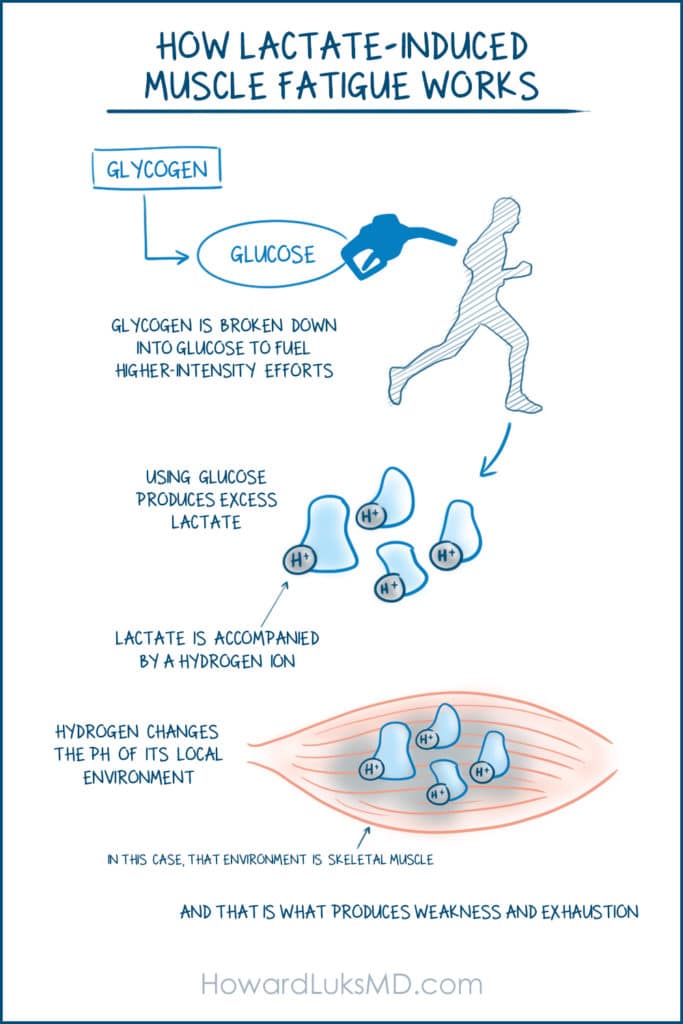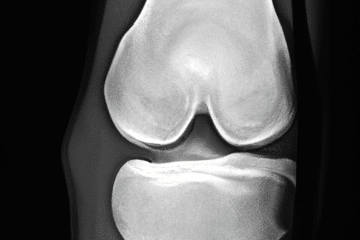
Serum lactate is a signaling molecule that plays an important role in various physiological processes, including muscle metabolism, brain function, and energy production.
Lactate, also known as lactic acid, is a byproduct of anaerobic metabolism, which occurs when the body is not receiving enough oxygen to fuel energy production through aerobic metabolism. Lactate is produced in the muscles and is transported to other organs, such as the liver and brain, where it is used as an energy source.
Before going further… we will discuss some of the many complex ways lactate interacts with our bodies. This is with respect to transient increases in lactate associated with exercise. If you are metabolically unhealthy and inactive, you may have a chronically elevated lactate level. This can produce unhealthy adaptations. In this case, exercise will bring down your basal lactate levels.
In muscle, lactate is produced during intense physical activity, such as high-intensity interval training (HIIT) or weightlifting. During these activities, the muscles are working at a high intensity, and the demand for oxygen exceeds the supply of oxygen. As a result, the muscles switch to anaerobic metabolism and begin to produce lactate. Lactate can then be transported to the liver, where it is converted back to glucose and used as an energy source for the muscles and other organs. This process is known as the Cori cycle.
Lactate also plays a role in the brain. It is a source of energy for the brain, and it has been shown to improve cognitive function and reduce fatigue during prolonged exercise. Studies have shown that lactate infusions can improve memory and cognitive function in individuals with cognitive impairment. Additionally, lactate has been found to increase blood flow to the brain, leading to improved oxygenation and brain function.

Lactate also plays a role in the regulation of insulin sensitivity and glucose metabolism. It has been found to increase insulin sensitivity in muscle and fat cells, leading to improved glucose uptake and metabolism. This is important for individuals with diabetes, as it can help improve blood sugar control.
In addition to its role in muscle metabolism, brain function, and glucose metabolism, lactate has been found to have anti-inflammatory and antioxidant effects. Studies have shown that lactate can reduce inflammation and improve antioxidant defense in tissues, such as skeletal muscle. This may be beneficial for individuals with chronic inflammation or oxidative stress-related conditions, such as obesity or type 2 diabetes.
In recent years, research has revealed that lactate also plays a role in cancer growth, cancer metabolism, and metastasis. Cancer cells have been shown to produce and consume lactate in large amounts, a phenomenon known as the Warburg effect. Cancer cells rely heavily on anaerobic metabolism and the production of lactate to fuel their growth and proliferation. This is because cancer cells have malfunctioning mitochondria, which is the cell’s power generator, which leads to cancer cells relying on anaerobic metabolism for energy.
In addition to fueling cancer cell growth, lactate has also been found to play a role in cancer metastasis. Studies have shown that cancer cells can manipulate the levels of lactate in their environment to create a favorable microenvironment for the formation and spread of metastases. Lactate has been found to promote the formation of new blood vessels, a process known as angiogenesis, which is essential for the growth and spread of cancer cells.
Furthermore, lactate has been shown to contribute to the development of resistance to cancer treatments. Cancer cells that produce high levels of lactate have been found to be more resistant to chemotherapy and radiation therapy. This is because lactate can protect cancer cells from the toxic effects of these treatments.
Lactate is critical in cancer growth, metabolism, and metastasis. The ability of cancer cells to produce and consume large amounts of lactate and the manipulation of lactate levels in the microenvironment, contribute to the malignant behavior of cancer cells. Therefore, targeting lactate metabolism in cancer cells may represent a promising strategy for the treatment of cancer.
In conclusion, lactate is a signaling molecule that plays an important role in various physiological processes. Its production in muscle during intense physical activity, and its use as an energy source for the liver, heart, and brain, as well as its ability to improve insulin sensitivity and glucose metabolism, reduce inflammation, and improve antioxidant defense, make it a molecule that is worth to be studied more.













